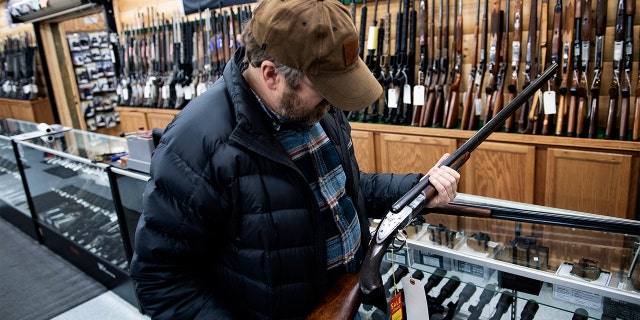While the rash of coronavirus cases in the White House may have upended election events and halted stymied political processes all around, it’s not slowing the push to confirm President Trump’s Supreme Court nominee, Judge Amy Coney Barrett, with the Senate Judiciary Committee set to begin the formal confirmation hearings on Monday.
And when it comes to the matter of gun control, her admission to the bench is poised to shake up the status quo — with or without a second Trump term.
So, where does Judge Barrett stand in regard to the Second Amendment?
“Judge Barrett, unlike many of her colleagues on the circuit courts, takes the Second Amendment seriously, using the text, structure, and history of the Constitution to understand and apply the rights protected,” Ilya Shapiro, director of the Robert A. Levy Center for Constitutional Studies and publisher of the Cato Supreme Court Review, told Fox News.
“If she is confirmed, John Roberts would no longer be the median or deciding vote on this issue, among others, so we can expect the court to finally start fleshing out the scope of the right to keep and bear arms and give lower courts guidance on how to evaluate Second Amendment challenges.”
AMY CONEY BARRETT HEARINGS: NOMINEE TO FACE SUPERCHARGED ATMOSPHERE IN THE AGE OF CORONAVIRUS

Judge Amy Coney Barrett speaks after President Trump announced Barrett as his nominee to the Supreme Court, in the Rose Garden at the White House, Saturday, Sept. 26, 2020, in Washington. (AP Photo/Alex Brandon)
According to some legal analysis, Chief Justice John Roberts has long been considered an outlier on gun issues – a conservative who could go either way – thus, the current four right-leaning judges have previously refrained from taking on Second Amendment affairs to avoid Roberts dissenting in the closing opinion.
“Judge Barrett considers herself a strict ‘originalist’ when it comes to constitutional interpretation, so one has to assume she clearly believes in the right to bear arms,” said Mark Williams, principal of the government relations firm Ferox Strategies, and former chief of staff for Congressman Mike Conaway, R-Texas. “It certainly would tilt the court to the conservative side of the argument. Especially considering some of the rulings and opinions she has recently made.”
TRUMP SAYS IT’LL BE ‘FAST AND EASY’ TO CONFIRM AMY CONEY BARRETT
Barrett is known to have presided over just a couple of gun-related cases, which have been dissected to examine her projected stance on the right to bear arms. Most notably, in Kanter v. Barr, a Second Amendment case decided last year by the Seventh Circuit Court of Appeals, Barrett “demonstrated that she understands and appreciates the need to look to the Founders to understand the full scope of Second Amendment rights,” underscored Alan Gottlieb, executive vice president of the Second Amendment Foundation (SAF).
“She dissented from an opinion upholding federal and state bans on firearm ownership by a man who had pleaded guilty to one count of mail fraud for falsely representing that certain therapeutic shoe inserts were Medicare-approved,” he surmised. “While recognizing the undeniably compelling interest in protecting the public from gun violence, she concluded that a blanket ban on owning firearms by nonviolent felons is unconstitutional.”
At the center of the case was a Wisconsin man named Rickey Kanter, who owned a firm that specialized in therapeutic footwear. In 2004, he submitted a selection of therapeutic shoe inserts to the Centers for Medicare & Medicaid Services for review to decide if they would reimburse patients who purchased them. The request was, at first, rejected and then approved following a revised application.
Kanter, nonetheless, sold both the authorized and nonauthorized renditions of the inserts to podiatrists and was eventually nabbed by prosecutors in Florida on charges of mail fraud, after sending a box filled with the unapproved product. He pleaded guilty to a single felony count, and with that came the standard lifelong prohibition of lawfully owning a firearm.
Yet Kanter went on to sue both the U.S. and the state of Wisconsin, contending they were both violating his constitutional right. In January 2018, a federal district court dismissed his argument. And then in March 2019, a three-judge panel in the Seventh Circuit upheld the lower Court’s ruling in a 2–1 decision – with Barrett, the sole objector.
CONCEALED CARRY PERMITS RISE DESPITE CLAMPDOWN FROM SOME STATES, REPORT FINDS
She stressed in a 38-page dissent that the Founding Fathers sought to block only violent felons from gun possession, writing: “Neither Wisconsin nor the United States has introduced data sufficient to show that disarming all nonviolent felons substantially advances its interest in keeping the public safe, and nor have they otherwise demonstrated that Kanter himself shows a proclivity for violence.”
Moreover, in the 2018 7th Circuit case the United States v. Watson, Barrett concurred with a suspect that the police in Indiana did not possess a reasonable suspicion to stop and investigate his vehicle for potential wrongdoing, based merely on an unverified tip.
In this situation, Barrett underscored, “citizens should be able to exercise the constitutional right to carry a gun without having the police stop them when they do so.”
Since promulgating a monumental opinion on District of Columbia v. Heller in 2008, cementing an individual right to bear arms, and then followed up by another landmark opinion concerning McDonald v. Chicago two years later, the Supreme Court has stayed away from probing petitions around the breadth of the ruling.

A customer looks at an antique shotgun at Cherry’s Outdoor World in Ottawa, Ohio, Jan. 23, 2020. (Photo by BRENDAN SMIALOWSKI/AFP via Getty Images)
So while Second Amendment cases typically don’t climb to the highest echelons of the U.S. legal system, observers say her selection could both bring more suits to the calendar and fundamentally shape those that are floating – perhaps most significantly, a case regarding a New York City gun law slated to be heard in the forthcoming term.
The ordinance restricts where licensed owners are allowed to take their handguns, prohibiting them from removing their firearm from the registered address, with the exception of traveling to certified arms ranges or shooting clubs.
The suit was filed in 2018 by the New York State Rifle & Pistol Association, under the guise that the provision illicitly prevents a New Yorker from transporting the gun to one’s “second home for the core constitutional purpose of self-defense or to an upstate county to participate in a shooting competition, or even across the bridge to a neighboring city for target practice.”
The Trump administration has encouraged the Supreme Court to overturn the legislation.
KLOBUCHAR CALLS ON SENATE TO DELAY BARRETT CONFIRMATION: BETTER FOR SAFETY, BETTER FOR THE COUNTRY’
Meanwhile, legal representatives for New York have pushed for the case to be thrown out, given that soon after it was agreed the case would be heard, the city amended the regulation to enable licensed owners to move their handguns to and from additional locations and claim that by taking it on, it paves the way for “petitioners (to get) everything they have sought in this lawsuit.”
There are several additional critical cases with the potential for a Supreme Court adoption – including Mance v. Barr, which centers on whether the federal ban on interstate handgun sales violates the Second Amendment or the due process clause of the Fifth Amendment, as well as Pena v. Horn, which revolves around “whether California’s Unsafe Handgun Act violates the Second Amendment by banning handguns of the kind in common use for traditionally lawful purposes.”
“Second Amendment rights have received a heightened level of public interest and amidst the pandemic, rioting, and increased crime in several cities. There’s an estimated five million new gun owners this year alone,” noted Phil Watson, a Second Amendment advocate and founder of Washington Public Relations. “The long term impact of over five million new gun owners that vote will be increased viability for pro-Second Amendment candidates; as well as more credibility and public support for jurists like Barrett who favor a legal philosophy that supports upholding these rights for individuals.”
Meanwhile, as much as the Barrett nod is being lauded by the likes of the National Rifle Association (NRA) and various other gun rights groups, advocates of tighter firearms legislation are vehemently pushing back.

Supreme Court nominee Judge Amy Coney Barrett listens as Sen. Jerry Moran, R-Ks., not shown, speaks during their meeting on Capitol Hill, Thursday, Oct. 1, 2020, in Washington. (AP Photo/Manuel Balce Ceneta, POOL)
For one, March For Our Lives – the student-initiated activist group formed in the wake of the 2018 Parkland shooting – opposed Senate Majority Leader Mitch McConnell’s backing of the preelection nomination last month with a stark mural outside his Washington, D.C. residence, calling for the seat left behind by the late Justice Ruth Bader Ginsburg not to be filled before the election.
“Hey Mitch,” the mural denoted. “We Call BS. Let The People Decide.”
CLICK HERE FOR THE FOX NEWS APP
Other anti-gun proponents have warned of a much darker reality should Barrett progress, with the likes of Shannon Watts, founder of Moms Demand Action, and a board member of the Supreme Court Voter project, cautioning that Barrett “puts years of gun safety progress at risk.”
“The president’s decision to try to ram through a new Supreme Court justice while early voting in the most important election of our lifetimes is already underway — and his selection of a judge with an alarming interpretation of the Second Amendment — lay bare just how high the stakes are for the gun safety movement,” Watts wrote in an editorial for USA Today in late September. “Over 145,000 Americans have been killed by guns with President Trump in office, and if he succeeds in appointing another opponent of gun safety laws to the court, even more Americans will die.”
However, McConnell has remained firm that a justice nomination by the president would be taken up by the current Republican-swayed Senate.

